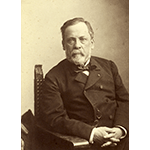Louis Pasteur
The French chemist and biologist is considered the father of modern microbiology. His first research for his doctorate at the Paris Normal School of Higher Studies was carried out in the field of crystallography. He continued his work, studying the process of fermentation. After years of scrupulous, methodical analyses, he identified the role of microrganisms in fermentation. Studying alcoholic fermentation, he demonstrated that it was not an exclusively chemical phenomenon, but that microrganisms played an essential role in it. The extension of this research led him to conceive, around 1860, of the process, known today as pasteurisation, which kills the microrganisms that could deteriorate a product, by bringing the liquid to a temperature that is quite high, but lower than the boiling point, and keeping it at this temperature for several minutes. Pasteur also studied the problem of the generation of microrganisms, arriving at a definitive confutation of the ancient theory of spontaneous generation. His research also had an important effect on medicine, allowing the importance of the role of microrganisms in the origin and development of pathologies to be recognised. In this sense, Pasteur is also considered the founder of modern immunology. He conducted research on many pathologoies such as septicemia, cholera, diphtheria, chicken cholera, tuberculosis, smallpox and rabies. For the latter disease he managed to develop an attenuated form of the virus that caused it, which could be utilised as vaccine. The first experimentation on human beings took place in 1885. In 1888 the Pasteur Institute was founded in Paris, directed by the scientist himself until his death. Today it is one of the world's most important research centres for the study of infectious diseases, biology, and molecular genetics.
Last update 04/gen/2008




